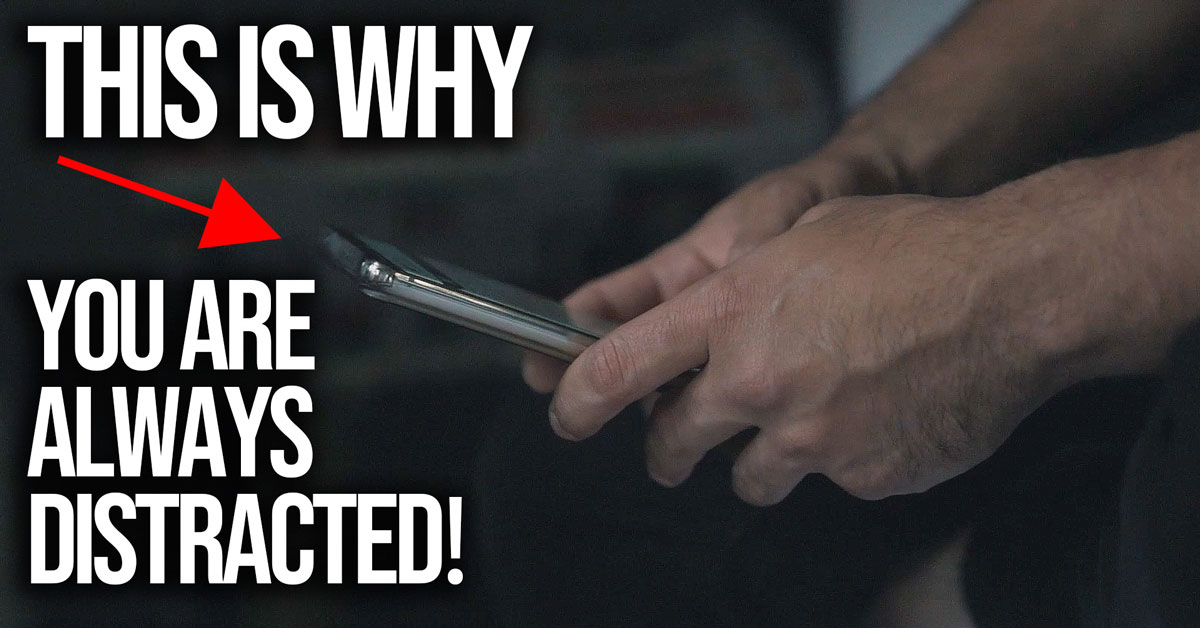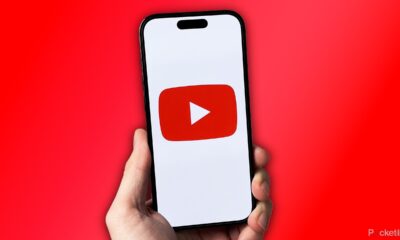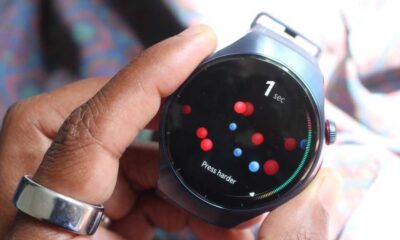Self Development
If You Can’t Focus & Get Distracted Easily: WATCH THIS

Nir Eyal, author of “Indistractable,” outlines steps to eliminate distractions and focus on the life you want to live, moving towards traction and taking control of your life.
To understand distraction, it’s important to know what it’s distracting you from. Distraction often begins internally, triggered by uncomfortable emotions we seek to escape. An indistractable person recognizes why they were distracted and takes action to prevent it in the future.
Distraction is anything that pulls you away from what you intend to do, while traction pulls you towards your goals and values. Understanding this difference and planning your time in advance can help turn distractions into traction.
External triggers, like notifications and alerts, can lead to distraction, but internal triggers, such as uncomfortable emotions, are often the root cause. By identifying and addressing these triggers, you can better control your focus and avoid distractions. Before we delve into those topics, let’s focus on what’s more critical than external triggers. The leading cause of distraction is not external factors, but rather internal triggers. These internal triggers are uncomfortable emotional sensations that we seek to escape from. All human behavior is driven by a desire to escape discomfort, whether it’s physical or psychological. We seek pleasure to alleviate discomfort, which is known as the “homeostatic response”.
We often turn to external distractions like social media, news, or other activities to escape these internal triggers. To become indistractable, we must first master these internal triggers and understand why we seek escape. The next step is to make time for traction by planning our day using a time-box calendar.
Values play a crucial role in managing distractions. We must align our values with how we spend our time in the domains of personal well-being, relationships, and work. By planning our time according to our values, we can avoid distractions and focus on what truly matters. The world is facing a crisis of loneliness, as social interactions have decreased over the years. To combat this, it is essential to prioritize spending time with loved ones by scheduling it into our calendars. This includes making time for reflective work at our jobs, which is often neglected in favor of reactive work.
To become indistractable, it is important to create a time-boxed calendar and sync schedules with important people in our lives. Additionally, we must hack back external triggers that lead us to distraction rather than traction. This can involve using tools to limit distractions from technology and other sources.
Preventing distraction can be achieved through pacts, which involve making precommitments to avoid unwanted behaviors. Effort pacts, price pacts, and identity pacts are strategies that can help us stay focused and avoid distractions in our daily lives. Effort packs involve adding some friction between ourselves and tasks we don’t want to do. An example of this is setting a timer to shut off the internet at a certain time each night to prevent late-night browsing. Price packs involve putting a monetary disincentive on the line. Identity packs involve identifying with a certain label, such as calling oneself indistractable, to help stay on track with long-term goals.
Distraction is not a new concept, with philosophers like Plato discussing it thousands of years ago. Today, distractions are abundant, but the key is learning how to stop getting in our own way. Blamers blame external factors for their distraction, while shamers blame themselves. Claimers, on the other hand, take responsibility for their actions and focus on responding to uncomfortable feelings in a healthy way to avoid distraction.
Ultimately, distractions are not entirely our fault, but it is our responsibility to manage them effectively. By adopting the mindset of a claimer and taking control of our responses to distractions, we can work towards achieving our goals. It is your responsibility to manage your response to the discomfort you feel every day, as it can lead you towards distraction. Distraction can be classified as certain behaviors by many people, such as playing video games being bad and distracting, while doing work is seen as good. However, any action can be either traction or distraction, depending on whether it is done with intent and forethought.
For example, if you guide your work life based on your to-do list, you may find yourself focusing on tasks that are urgent, easy, or fun, rather than what is truly important. Distraction tricks us into thinking that we are being productive by engaging in tasks like checking emails or notifications, when in reality, we are avoiding the important work that needs to be done.
Becoming indistractable is a crucial skill in today’s world, and will become even more important as technology advances and distractions increase. It is essential to take control of your time and attention, rather than allowing external factors to dictate how you live your life.
While some may believe that technology is addicting us and controlling our brains, it is important to remember that we are more powerful than we think. By implementing simple techniques, we can regain control over our time and attention, rather than letting technology control us.
It is crucial to find healthy ways to cope with discomfort, rather than seeking immediate escape through distractions. Embracing uncomfortable emotions and using them as motivation towards traction can help us move forward and achieve our goals. Feeling bad is not inherently negative, and it is important to recognize that discomfort can drive us towards growth and progress. And if you can harness that discomfort and use it to your advantage, this is how we get ahead, this is how we make the world a better place, by understanding that discomfort and dealing with it in a healthy way, as opposed to trying to escape it with distraction in an unhealthy manner.
So there’s a technique called “progressive extremism” that can really be a useful tactic if you’re trying to change your life in a positive manner. And this acknowledges the fact that temporary fixes are pointless. What’s the point of getting in shape by going on some kind of fad diet so you can fit in your wedding dress for just one day, if you’re not maintaining a healthy lifestyle forever? The point of getting in shape is to have the benefits for the rest of your life. So instead of having some kind of crash diet, which we know people tend to bounce back from and with a vengeance, instead, what we want to do is to train ourselves with this technique called progressive extremism.
What does progressive extremism mean? Progressive extremism means that we are going to remove some kind of unhealthy behavior in our life for the rest of our lives, nut we’re going to do it in a very small way.
Here’s how it works: So for me, when I decided I wanted to eat less processed sugar, I didn’t say, “That’s it, I’m never touching processed sugar ever again.” Instead, what I said was, “I am going to cut out one food that’s refined sugar for the rest of my life.” But it has to be easy. So the first food I started with was candy corn. Now, I don’t know if you like candy corn, I don’t really like candy corn all that much. I would eat it kind of on Halloween when my daughter would bring it back from trick-or-treating. It’s kind of the dregs of the Halloween haul. And so I decided one year, “You know what? I’m eating these things not because I like them, but because they’re just here. Well, they’re never going to be here ever again.” And so I pledged myself, “I’m never going to eat another candy corn for the rest of my life.” No big deal, I didn’t really like him to begin with. And then I was ready to do a bit more, to progress. So the next thing I said I’m not going to eat ever again, was I excised sodas, sugary sodas in the house. Now, I told myself I could drink sugary sodas outside the house, just not in the house. That was the first tiny baby step that I was going to take along this path of progressive extremism. When I was ready, about a month later, I decided to excise more and more and more. And so today, after years of doing this, there’s all kinds of things that I just don’t eat. And what we’re doing is leveraging an identity that we know that people who say that “they don’t” versus those who say “I can’t”, are much more likely to stick with their long-term goals.
Because when you say “I don’t do something,” for example, “I don’t eat meat, I am a vegetarian,” versus “Oh, no, thanks, I can’t because I’m on a diet,” you’re much more likely to stick over the long term. So when you regularly review this list of “Wow, look at all the things that I don’t have in my life anymore, starting with candy corn, sugary drinks,” whatever the case might be these small, simple things that you’ve removed from your life over years, and this takes time and commitment, what you’ll find is that you’ll be very proud to have this entire list of things that you don’t really miss anymore, because you took this path of progressive extremism. So if there’s one mantra that summarizes my five years of research into the psychology of distraction, it’s this: that the antidote to impulsiveness is forethought.
You see, our species has an amazing gift that no other animal on the face of the earth has, which is that we can see into the future. We can predict what is going to happen with greater fidelity than any other animal that roams the earth. And so we should use that capability because if you wait till the last minute, you will lose. If you wait until the cigarette is lit in your hand, you’re going to smoke it. If you wait till the chocolate cake is on a fork on the way to your mouth, you’re going to eat it.
If you sleep next to your cell phone every night, of course, it’s going to be the first thing you pick up in the morning before you say hello to your loved one. So don’t wait to the last minute. What I discovered in my five years of research, is that people who are indistractable, they don’t have a lot of willpower, they don’t have a lot of self-control; what they have is a system. They plan today to make sure they don’t get distracted tomorrow. By mastering the internal triggers, making time for traction, hacking back the external triggers, and preventing distraction with pacts, this is how anyone can become indistractable. Please rewrite this sentence for me.
-

 Destination8 months ago
Destination8 months agoSingapore Airlines CEO set to join board of Air India, BA News, BA
-

 Breaking News10 months ago
Breaking News10 months agoCroatia to reintroduce compulsory military draft as regional tensions soar
-

 Gadgets3 months ago
Gadgets3 months agoSupernatural Season 16 Revival News, Cast, Plot and Release Date
-

 Tech News12 months ago
Tech News12 months agoBangladeshi police agents accused of selling citizens’ personal information on Telegram
-

 Productivity11 months ago
Productivity11 months agoHow Your Contact Center Can Become A Customer Engagement Center
-

 Gadgets3 weeks ago
Gadgets3 weeks agoFallout Season 2 Potential Release Date, Cast, Plot and News
-

 Breaking News10 months ago
Breaking News10 months agoBangladesh crisis: Refaat Ahmed sworn in as Bangladesh’s new chief justice
-

 Toys12 months ago
Toys12 months ago15 of the Best Trike & Tricycles Mums Recommend























